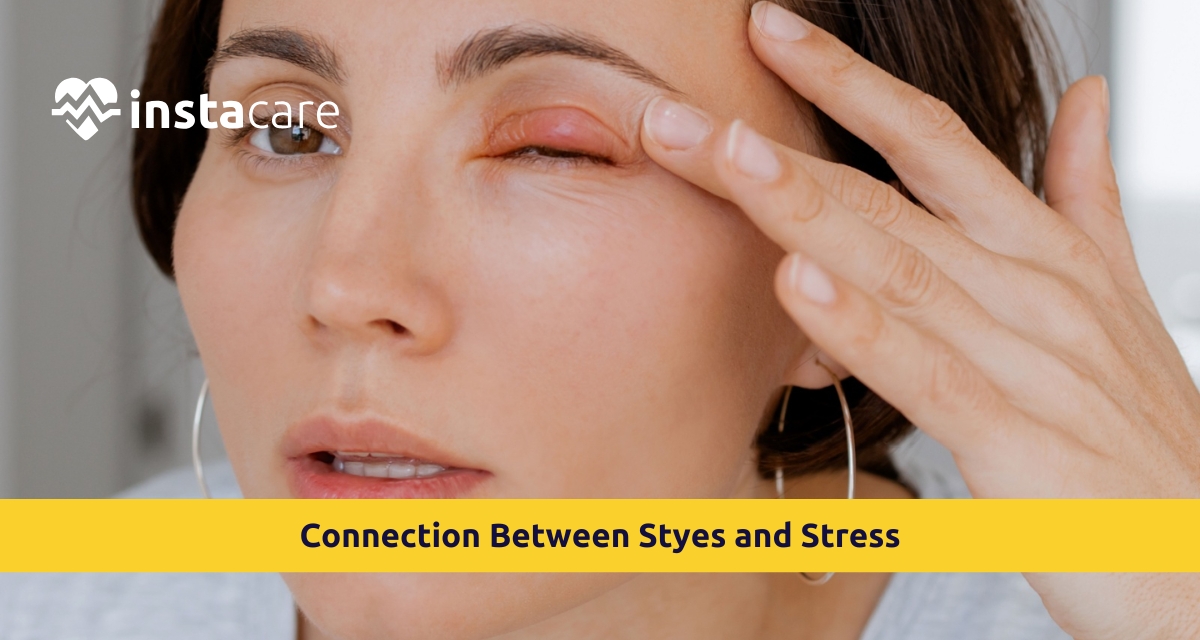Hordeola, or styes, are a relatively common, sometimes painful, eye disorder that provoke redness, swelling, and a painful spot. These small lumps commonly form on the eyelid due to bacterial infection. Although most people hold the belief that styes are due to bacteria, many question whether stress may play a role in getting a styes. This article examines the relation between stress and styes, which one may envision could be influenced by stress for creating greater susceptibility to styes.
Understanding Styes
A styes is a swollen and inflamed pimple resulting from an infection of the oil glands or the hair follicles in the eyelids. Styes can occur on either side of the eyelid and are characterized by the following symptoms:
- Redness and Swelling: The infection usually makes the area
red and inflamed. It hurts a lot.
- Sore and Painful: Styes are tender and painful because of
the reason that sometimes they can be painful in the action of blinking or on
simple touching.
- Pus-Filled Spot: Sometimes, the pustule bump full of pus
creates a stye that later on may drain out.
Styes are typically benign and tend to resolve spontaneously
within a week or so. However, they can be very painful and at times may
necessitate medical treatment.
Causes of Styes
The primary causative agent for styes is bacterial infection especially from Staphylococcus aurous. This kind of bacterium penetrates through the oil glands or hair follicles of the eyelid leading to inflammation and pus. Contributing factors that lead to the development of a sty include;
- Lack of Hygiene: Most bacteria are introduced to the eyelid
via non-cleaned hand contacts from unhygienic handling.
- Old or filthy cosmetics introduce the bacteria via
application.
- Blepharitis is an inflammation of the margins of the eyelid
and predisposes to styes development
- Stress and Poor Immunity: Stress will weaken immunity so that the person cannot fight infection, making easier the formation of styes
Role of Stress in Health
Stress is a response to any stressful situation. Stress can
be either emotional, physical, or mental. Although acute stress is beneficial
for a man stimulating his actions, chronic stress is negative and harms the
body in broad.
How Stress Impacts the Immune System
Hormonal Changes: It secretes several hormones during the
stressful times, including the following:
Cortisol and adrenaline.
These increases in high levels tend to degrade the capacity of the body’s immune system to allow the body to fight infections effectively.
- Inflammation: This stress is protracted and consequently
results to protracted inflammation in the body which leads to number of skin
infections and diseases.
- Behavioral Factors: Stress affects food habits, sleep patterns, and one’s hygiene. All these lead to, or contribute to further weakening of the immune system.
Stress and Eye Health
Although bacterial infection is the main cause for the formation of a stye, the development process of a stye may include other factors as stress:
- Weakened Immunity: Another effect of extreme stress is the
weakening of the immunity inside a person's body, which allows more bacteria to
survive. This could make it harder for the eyes to combat this, and therefore
increases the chances of getting a stye.
- Eye Rubbing: Stress causes irritation and stress on the
eyes. People during these times tend to rub their eyes profusely. This
eventually can be one mode of entry of infection due to the bacterial flora
present on hands.
- Stress Worsening of Antecedent Condition: For persons already suffering from a preexisting condition like Blepharitis, the symptoms due to stress increase and hence predispose them towards getting styes.
How Stress can be mitigated to Avoid Styes
It is not possible to totally eliminate stress in one's
life; however, it is quite possible to deal with the amount of stress which may
eventually become a cause of styes to form in your eyes:
1. Hygiene
Avoid the formation of styes by practicing good hygiene. Be
sure to wash your hands quite often and never touch your eyes. Also, change
your eye makeup every now and then and do not borrow cosmetics from any other
person. Clean and store your contact lenses properly.
View More: How Does Emotional Stress Affect Your Health
2. Stress Relief Routine
Engage in stress-relieving activities. Here are some of the most effective ones:
- Exercise: Regarding source of pressure reduction, the survey
reveals that, scheduling time for physical activity is a useful strategy.
Adults are encouraged to carry out at least thirty minutes of moderate
intensity activities most days of the week. Any kind of exercise including
walk, jog, yoga or even dancing etc. can be undertaken. The chemical produced
by exercises called endorphins are used in enhancing moods as well as;
decreasing stress.
- Mindfulness and Meditation: Consequently, mindfulness or meditation
soothes the mind and lower anxiety. Take ten minutes a day focusing on your
breathing or use an application for meditation.
- Deep Breathing Exercises are primarily useful in relaxation techniques mostly preferred to ease anxiety. Breathe in with air, retain for some time and then exhale through the mouth slowly. Repeat a few times.
3. Sleep Enough
Adequate sleep helps in having a healthy immune system. Try
getting between 7-9 hours of good quality sleep each night for your body to
fight off the infections. Try to maintain an equally regular sleep schedule by
going and waking up at the same time every day.
4. Hydration and Healthy Nutrition
A diet that is well balanced and prepared through fruits,
vegetables, whole grains, and proteins would have all the powers necessary to
develop strength in immunity. Proper hydration is also seen as a good thing for
health. It is typically recommended to drink at least eight 8-ounce glasses of
water daily and reduce sweet liquids.
5. Diminish consumption of caffeine and alcohol
Alcohol and caffeine will have a severe impact on the sleep
cycle and will cause anxiety to rise. Taking foods with caffeine should also be
cut out during the afternoon and particularly during evenings. Yes, alcohol may
make you sleep but your body will get awake at some point in the night in the
middle of the night.
6. Relaxing Environment
The environment you stay in determines the ease with which
you can relax. You can try to set up a room in your house where you
specifically relax. Popular examples include dim lights, soft cushions, and
lavender-scented perfume.
7. Hobbies
Engaging in an activity that you enjoy will surely help you
cope with stress. It might be painting, gardening, reading, or music; spending
some time on hobbies is a healthy way to elevate your mood and relax.
8. Experts
If this is too much to handle, seek a professional mental health. Therapy or counseling is what one learns to handle a situation and
improve his life. Cognitive-behavioral therapy is the approach that works when
dealing with stress and anxiety.
When to see a Doctor
Self-limiting, styes can be but in the following cases, one should consult a doctor:
- Recurring Stye: The stye should be treated if he is not fine
within a week.
- Severe Pain or Swelling: In case the man is in tremendous
pain or possesses excess swelling; he should look for professional medical
service.
- Blurred Vision: Due to distorted vision because of the
presence of stye, the person needs urgent medical attention brought.
- Fever: Fever might also be possible, which would indicate
that there is something critically brewing with the infection.
- According to the given situation, the doctor can suggest the
right form of treatment: either antibiotics or drainage of the stye.
Conclusion
Since the majority of styes are caused by bacteria it is highly likely that stress will have an impact on the development of this disease. Simple things like washing your face, hand or anything around your eyes properly and effectively, reducing pressure on the area or region of the face where the styes are likely to appear can help to minimize the probabilities of developing styes.
Paying attention to your body and acting when necessary is important. Taking proactive steps toward stress management and eye health can lead to a happier, healthier life. Well-being, specifically mental health, would be looked upon in order to prevent these infections such as styes.
Please book an appointment with best Psychologist in Lahore, Karachi, Islamabad, and all major cities of Pakistan through InstaCare, or call our helpline at 03171777509 to find the verified doctor for your disease.












